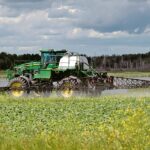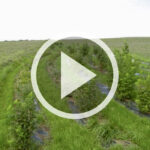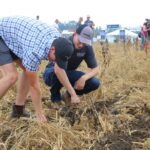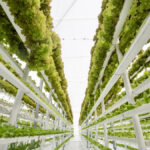Whether you call them feral pigs, boar, swine, hogs, or even razorbacks, wild pigs are one of the most damaging invasive species on Earth, and they’re notorious for damaging agriculture and native wildlife. A big reason they’re so harmful is because they uproot soil at vast scales, like tractors plowing a field. Our new research […] Read more
News — page 313

Wild pig damage extensive across the globe
Researchers consider them one of the most damaging invasive species on Earth

Glyphosate limits may be increased
Pest management agency aims to harmonize Canadian levels with competitors
Glacier FarmMedia – In May, Health Canada proposed increasing the maximum residue levels of glyphosate for commodities such as oats, lentils, peas and beans. Canadians had 75 days to comment on the changes. The consultation period ended July 20. For certain crops, the proposed MRLs are higher than previous levels. Why it matters: Glyphosate is […] Read more

VIDEO: Buffer strips a boon for beneficial insects
Field Talk with Jennifer Doelman
In this edition of Field Talk, Farmtario contributor Matt McIntosh talks with Jennifer Doelman, an agronomist, farmer and beekeeper from Renfrew County on the value of buffer strips, establishment methods, and integrated pest management fundamentals.

Opinion: Farm policy for the future
It’s safe to say that most farmers in Canada don’t really know the history of farm policy developments in this country and they don’t really care. What they do care about is whether supports will be there for them in their times of need, whether that’s when dealing with this year’s drought, last year’s pandemic […] Read more
CFA initiating Hay West program
The Canadian Federation of Agriculture (CFA) says it has begun work to facilitate a “Hay West” initiative to send surplus hay from farmers in Eastern Canada to those struggling in the West with drought conditions and feed shortages. The first Hay West initiative occurred in 2002 when Prairie farmers were facing similar drought conditions. Ten […] Read more

In-person crops show set for September
Crop Stop will be hosted by Canada’s Outdoor Farm Show in Woodstock
A new outdoor in-person event for crop farmers, called Crop Stop, has been announced by Canada’s Outdoor Farm Show. The new event is set for Sept. 23 and 24. It came out of discussions between the Canada’s Outdoor Farm Show team and crop companies with plots at the site. Amid COVID-19 uncertainty around large in-person […] Read more

Mental health support receives funding
Three new initiatives to support and promote mental health in Ontario’s farming and rural communities will receive over $430,000 in funding by the governments of Canada and Ontario. These projects will provide more data on farmer and rural mental health in Ontario to ensure available supports meet unique community needs. In a release, the provincial […] Read more

Tech seen as a game-changer for agriculture
Food companies are using technology to push boundaries and make production more sustainable, reliable and secure
Glacier FarmMedia – Compared to cattle, crickets punch far above their weight as a source of protein. “There’s a biological organism that is arguably the most ancient source of protein that humans have ever consumed in recorded history that has the most efficient feed-to-protein conversion and that is insects,” said Muhammad Ashour, co-founder and chief […] Read more

France bans killing of male chicks
Reuters – France’s agriculture minister has announced a ban on the killing of male chicks by crushing or gassing, effective next year. The practice has been denounced as barbaric by animal welfare groups, and they will push for a similar measure at European level. Each year, 50 million male chicks are culled in this way, […] Read more

Opinion: How Ontario’s livestock innovation system should change
LRIC studying five stages necessary for innovation
We hear a lot about innovation and how agriculture will be transformed in the coming years. The fact is that agriculture is in a state of continual transformation. Exactly where the livestock sector goes depends on how well the five stages of our innovation system work and interact. The five stages are funding, research priorities, […] Read more


